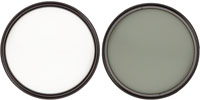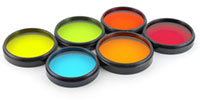Photography Filters
Filters – The Must-Have Accessory for Creative Photographers
A filter is a glass or resin element which sits in front of your lens and alters the light entering your camera. They can be used for a wide variety of uses and creative effects. Although great things can be achieved in the digital darkroom filters still offer many benefits to the photographer.
In the age of digital photography, some people believe that filters are no longer necessary. Effects which would once have only been possible using filters can now be achieved in photo-editing software. However, there is still a place for filters, and some of the things they can be used for can’t be replaced by photo-editing effects. As well as adjusting color and creating special effects, filters offer protection to lenses and can be used to alter the amount of light entering the camera.
The following are must-have filters for the creative photographer.
 UV & polarizing filters
UV & polarizing filters
1) UV filters.
UV filters remove ultra-violet light rays which can make shots look hazy, although this has become less of an issue with modern digital cameras. UV filters are
cheap to buy and there’s a good argument for saying that every lens you own should
be fitted with one. As they have a neutral influence on color or light levels, UV
filters are a great way of protecting the valuable elements at the front of lenses. If a
filter is scratched, it’s much cheaper to replace than a lens.
2) Polarizing filters.
Polarizers control the amount of polarized light entering a lens, and can be used to
saturate colors and darken skies. Polarizing filters can reduced to remove reflected
light from glass or water, and have many practical uses for the photographer. Rotating
the front of a polarizing filter regulates the effect, so they offer great flexibility.
Polarizers are a must-have for landscape photographers, and they be used to create
stunning blue skies and beautiful clear shots of lakes and rivers.
3) Close-up filters.
Some lenses offer a macro facility for close-up photography, but close-up filters are a
great alternative for entering this fascinating world. Close-up filters come in a variety
of magnification levels, and allow you to focus more closely than a standard lens
allows. Before buying a macro lens, consider using close-up filters as this will save you a lot of money.
4) Neutral density filters.
By reducing the amount of light entering the lens, neutral density filters offer a
great range of options to the creative photographer. Neutral density filters come in a
range of densities, and the greater the density the less light can pass through. When
working in bright conditions, neutral density filters allow the photographer to use
long exposures for creative effects. For example, the movement of water and clouds
can be illustrated with a blur of motion. Graduated neutral density filters allow the
photographer to balance the difference in brightness between the land and the sky.
 Color filters
Color filters
Notes
- Color filters were popular in the days of film, for correcting colors and creating special effects. They can still be useful and/or fun to play with, but for most applications they have been made redundant by digital processing.
- Some filters can be screwed to the front of lenses, so you will need different sizes if you use a variety of lenses. Square filter systems offer greater flexibility, and use special adaptors which attach to the front of lenses.